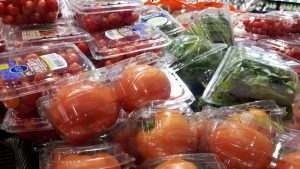Checking in on the first Ontario town to ban single-use plastics
One year after Fort Frances became the first municipality in Ontario to ban single-use plastics, some businesses and customers say the transition to recyclable and compostable alternatives has been relatively smooth.
Nonetheless, the town has opted to delay enforcing the bylaw due to supply chain concerns raised by some restaurant owners.
The ban took effect on Jan. 1, 2021, and enforcement was initially delayed by one year to give businesses time to adapt to the new requirements. Town council voted late last year to further delay enforcement until June 30.
The bylaw prohibits the distribution of Styrofoam takeout containers, plastic swizzle sticks, stir sticks and straws; and plastic grocery bags. It contains a number of exceptions, such as allowing plastic straws to be handed out upon request so that people with disabilities who need the items can still access them.
COMPOSTABLE ALTERNATIVES TO PLASTIC GROCERY BAGS
As the federal government prepares to implement a single-use plastics ban before the end of 2022, CBC Thunder Bay reached out to people in Fort Frances to learn about their experiences in their northwestern Ontario town.
“It’s been accepted very well,” said Craig Sanders, who owns The Place, an independent grocery store. “I mean, for the first couple of days, there were a couple of people complaining, but it doesn’t take people long to get used to the idea that there’s been a change, and this is how things have to be.”
Sanders spent much of the year preparing to transition away from plastic grocery bags and found a supplier who offers a compostable alternative, he said. He made the transition after Christmas, and now offers both paper and compostable plastic bags for 10 cents each.
“Plastic bags were costing us just over two cents,” he said. “The new ones are costing us 12 to 15 cents, depending on whether it’s paper or plastic. So we’ve implemented a charge. And we’re seeing people bring their own bags a lot more often.”
Sanders estimated he handed out around 1,500 plastic bags a week prior to the implementation of the single-use plastics ban. He’s now giving out between 800 and 900 recyclable or compostable alternatives, and that number is trending downward.
Grocery store customer Nadine Cousineau said she usually brought reusable bags to the store even before the plastic bag ban, so it wasn’t hard for her to adjust. But she said things are a little more complicated now if she forgets those bags.
“The grocery store here actually offers paper bags, but you pay for them — I believe it’s like 15 cents a bag — so there’s that option, she said.
“But they do often run out. So I either just load up my cart with all my groceries and then put them in my vehicle, or I buy another reusable bag … And I know quite a few people who end up having about 100 reusable bags, because they forget their bags, and then they have to buy new ones every time they go to the store.”



